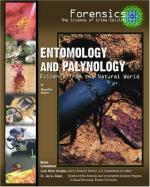|
This section contains 783 words (approx. 3 pages at 300 words per page) |

|
Palynology is the study of fossil pollen (and sometimes plant spores) extracted from lake sediment, peat bog, or other matrices. The most common goal of palynological research is to reconstruct the probable character of historical plant communities, inferred from the abundance of species in dated portions of the fossil pollen record. Pollen analysis is an extremely useful tool for understanding the character of ancient vegetation and its response to changes in environmental conditions, particularly in climate. Pollen analysis also has an economically important modern industrial use in the exploration for resources of fossil fuels. Palynology is also used to help reconstruct the probable habitats and foods of ancient humans and of wild animals.
Pollen consists of microscopic grains containing the male gametophyte of coniferous (cone-bearing) and angiosperm plants. Pollen of most species of plants undergoes a long-distance dispersal from the parent plant, so that fertilization can occur among...
|
This section contains 783 words (approx. 3 pages at 300 words per page) |

|


